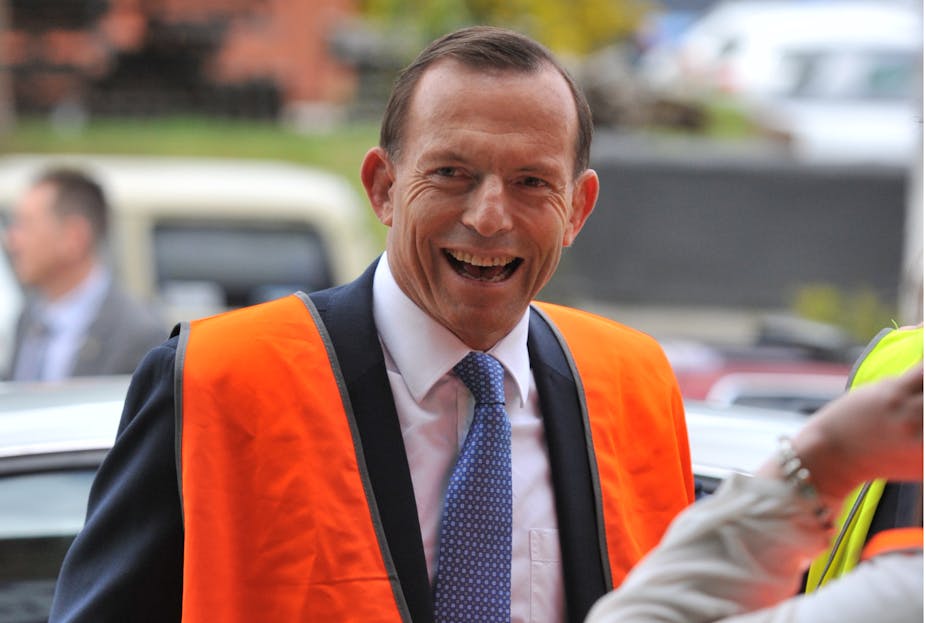It was the ultimate “get stuffed”. Within hours of an email being sent around ministerial offices declaring that all requests for interviews should be referred to the Abbott office, the dictat was on the Australian Financial Review’s website.
The Abbott office says it’s just about co-ordination, not having people out there falling over each other on the multiple Sunday morning shows. Abbott believes it is a desirable continuation of the military-type discipline imposed in opposition.
“It is important that we continue in government the sorts of arrangements that we had in opposition,” he said yesterday. “It is very important that the government speaks with a united voice … that the government responds cohesively and consistently to the various issues of the day.” In opposition, he said, before senior colleagues did media “they normally called in with my office.
"It was a very good arrangement in opposition, it is a very good arrangement in government and it is one that my colleagues have always been happy to comply with.”
No one doubts that discipline is vital in politics, or that ministers need to be briefed on what is being said and be generally in sync. But the situation that we’ve reached – with the previous government, the Coalition in opposition, indeed back to the Howard government, and now (aspirationally) the Abbott government – where frontbenchers and backbenchers sound like parrots on a perch is an insult to the voters and indeed to the politicians themselves.
It’s made worse by the round the clock media cycle which demands endless talking heads. The opportunity to appear on TV is much more available now than a few years ago, and it can be good experience for up and comers. “We [politicians] are very keen on television cameras,” junior minister Jamie Briggs admitted (on television) yesterday. But if it’s just to repeat “lines”, there is not much value-add for anybody. I have in mind one exceptionally intelligent MP who is regular “talent” – and never says anything.
Ministers have to be careful – the basis of cabinet government is collective responsibility. But does anyone think that Joe Hockey, Warren Truss, or Julie Bishop should need to be herded? Or will be? And what about junior minister Arthur Sinodinos, who sometimes (perhaps to his cost, given he missed out on cabinet) makes original contributions? (It’s an interesting situation for Sinodinos, who used to be quite a tough enforcer when he was Howard’s chief of staff.) As for the backbenchers, if they are not to be allowed any public leeway – which is the way the Abbott disciplinarians would like it – perhaps we could just get the mantras from one a day.
More seriously, the Coalition in particular has a number of high flyers coming in as new members to this parliament, such as former West Australian treasurer Christian Porter and the member for Hume Angus Taylor, who has an impressive CV. They should be given some scope to show their talents as real people, not just actors mouthing lines put together by spin merchants.
Surely it is humiliating for people who’ve had substantial careers in other areas to suddenly find themselves ordered about by apparatchiks whose CVs may be thin. But also, it is hard enough to attract good people to be parliamentarians - if they are then just to be cyphers, there is even less incentive for those who have plenty of life choices to choose politics.
The default instinct of many political players and minders is secrecy. Control over information is a source of power – in relation to opponents and to the media. Hence the government’s restrictions and blackouts on information about boat arrivals and turnbacks.
Secrecy is also often seen as the safe resort, sometimes wrongly. When the Liberals ran into trouble with a couple of Western Sydney candidates in the election they hid them from the media (indeed most candidates were kept from the national media). Now there is retrospective criticism of the tactic, with some Liberals saying the candidates in trouble should have been prepped and got back onto their horses.
Recent academic surveys and the parties’ own polling show how disillusioned people are with politics. They want more “authenticity”, something politicians talk about but are not much providing – indeed the “authenticity” is often itself contrived. Unless the politicians address the cynicism, it will fester and compound. Such a mood contributes to a capricious electorate, which can easily turn on the mainstream parties; voters become attracted to those with a populist pitch who appeal to their disgust with how politics is being conducted.
At the recent election Clive Palmer was the beneficiary of the current public mood. Palmer will have two senators, maybe three, and he may be in the House of Representatives (depending on a recount in Fairfax).
Palmer has played the ultimate trick on those who like controlled politics. Through his Senate success, he has dealt himself into the big boys’ game. He will have some real power, given the government will need to marshal crossbench support to get its legislation through.
But Palmer is completely beyond control and out of control. He will say and perhaps do anything, any time. Someone in the Coalition will have to be delegated to deal with the PUPs. Maybe the Abbott office mightn’t be so anxious to try to take to itself that prickly task.

